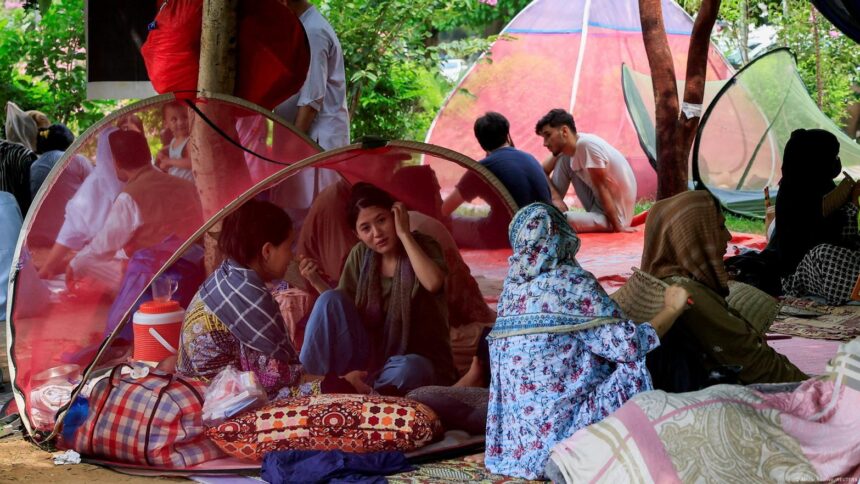RASC News Agency: Pakistani media report that nearly 300 Afghanistani migrant families are enduring dire conditions in one of Islamabad’s public parks. Most of these families consist of women and young children, who were compelled to flee Afghanistan following the Taliban’s return to power. They left behind their homes, livelihoods, and security, only to face years of uncertainty abroad. Many remain in legal limbo, confronted with the looming threat of deportation from Pakistan. Samiya, a 24-year-old migrant who left Afghanistan in 2022, told Geo News: “We were forced to escape because our lives were at risk, and Afghanistan no longer offered a future for our children. But even here, we are not safe.” Among these displaced are women who previously served in the Afghanistani police or military. Under the former Afghanistani government, they enjoyed professional stability, financial security, and personal safety. With the Taliban’s return, these women not only lost their employment but also faced direct threats to their lives, compelling them and their families into exile.
Currently, Afghanistani migrants in Islamabad are caught in a precarious balance between hope and despair, urgently seeking resettlement in safer countries. According to Pakistani sources, over 1.3 million Afghanistani nationals hold Proof of Registration (PoR) cards, while an additional 750,000 possess ECC citizenship cards. Earlier this month, the Pakistani federal government issued a new directive requiring Afghanistani migrants in southwestern provinces to depart, part of a policy initiated in early 2023 that has already forced over one million Afghanistani nationals to leave the country. In recent weeks, multiple civil society organizations have jointly called for urgent international intervention to address the plight of Afghanistani migrants in Pakistan, advocating for their expedited relocation to European countries, particularly Germany. Despite these appeals, both Iran and Pakistan have intensified deportations of Afghanistani nationals, including those awaiting humanitarian visas for transfer to Europe. Many migrants seeking asylum have been detained by Pakistani authorities and forcibly returned.
German federal authorities have recently confirmed that emergency transfers of Afghanistani migrants from Pakistan for humanitarian visa processing are currently impossible, leaving tens of thousands stranded in precarious and unsafe conditions. Analysts warn that the Taliban’s draconian policies and systemic repression are the root cause of this escalating humanitarian crisis. The mass exodus of Afghanistani citizens particularly women, former civil servants, and security personnel is a direct consequence of the Taliban’s governance, which has dismantled the country’s institutions, eliminated opportunities for professional and personal security, and created an environment in which flight is the only viable option. This growing population of vulnerable migrants not only underscores the immediate human toll but also highlights the broader regional instability generated by the Taliban’s continued mismanagement, corruption, and oppressive rule.
The situation serves as a stark reminder that the Taliban’s policies are not merely a domestic concern but a pressing regional and international challenge, as millions of Afghanistani civilians are rendered stateless and vulnerable due to the regime’s failure to provide even minimal protection or basic human rights.






